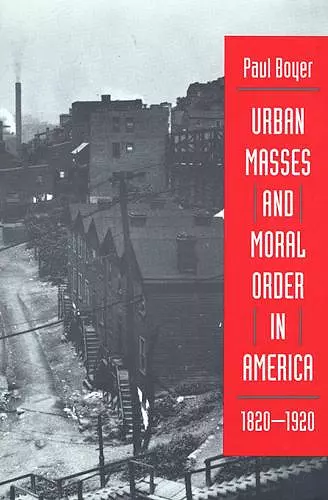Urban Masses and Moral Order in America, 1820-1920
Format:Paperback
Publisher:Harvard University Press
Published:31st Mar '92
Currently unavailable, and unfortunately no date known when it will be back

For over a century, dark visions of moral collapse and social disintegration in American cities spurred an anxious middle class to search for ways to restore order. In this important book, Paul Boyer explores the links between the urban reforms of the Progressive era and the long efforts of prior generations to tame the cities. He integrates the ideologies of urban crusades with an examination of the careers and the mentalities of a group of vigorous activists, including Lyman Beecher; the pioneers of the tract societies and Sunday schools; Charles Loring Brace of the Children's Aid Society; Josephine Shaw Lowell of the Charity Organization movement; the father of American playgrounds, Joseph Lee; and the eloquent city planner Daniel Hudson Burnham.
Boyer describes the early attempts of Jacksonian evangelicals to recreate in the city the social equivalent of the morally homogeneous village; he also discusses later strategies that tried to exert a moral influence on urban immigrant families by voluntarist effort, including, for instance, the Charity Organizations' "friendly visitors." By the 1890s there had developed two sharply divergent trends in thinking about urban planning and social control: the bleak assessment that led to coercive strategies and the hopeful evaluation that emphasized the importance of environmental betterment as a means of urban moral control.
This unusual work in social history...clarifies the most troubling contradiction in democratic theory and practice: In a society in which each person has identical legal status without hereditary rank, and no social institution—such as a church—enjoys official recognition, no elite should have the right to prescribe a code of behavior binding on the members of the social order. Yet without such a code of traditional conduct, how can a democratic society avoid decay and chaos when it loses the original homogeneity of its population and changes the economic relations among its people?... Whatever the future may hold, the issues raised with such tact by Boyer remain crucial. -- Roger Starr * New York Times *
Boyer has given us a logical, unified, and richly textured moral genealogy... The research and the grand comprehensiveness of the book will assure its permanence and authority for many years to come. -- Bertram Wyatt-Brown * Reviews in American History *
Into his epic tale Boyer introduces a fascinating assortment of movements and people... It is excellent at invoking the excitement surrounding the birth of now commonplace features of the urban landscape... Its true achievement lies in the imaginative weaving together of such a diverse collection of measures and men into a single compelling story, which ultimately is the story of the modernization of America. -- M. J. Heale * Journal of American Studies *
ISBN: 9780674931107
Dimensions: unknown
Weight: 608g
432 pages